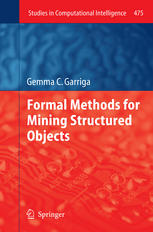

Most ebook files are in PDF format, so you can easily read them using various software such as Foxit Reader or directly on the Google Chrome browser.
Some ebook files are released by publishers in other formats such as .awz, .mobi, .epub, .fb2, etc. You may need to install specific software to read these formats on mobile/PC, such as Calibre.
Please read the tutorial at this link: https://ebookbell.com/faq
We offer FREE conversion to the popular formats you request; however, this may take some time. Therefore, right after payment, please email us, and we will try to provide the service as quickly as possible.
For some exceptional file formats or broken links (if any), please refrain from opening any disputes. Instead, email us first, and we will try to assist within a maximum of 6 hours.
EbookBell Team

5.0
50 reviewsIn the field of knowledge discovery, graphs of concepts are an expressive and versatile modeling technique providing ways to reason about information implicit in a set of data. Interesting examples of this can be found under the mathematical theory of formal concept analysis, dedicated to the construction of a lattice of concepts by defining a Galois connection on a binary relationship. This book present such graph of concepts under the more complex case of data that comes in a set of structured objects; e.g. a set of sequences, trees or graphs. Nodes of this graph will represent patterns in the data and edges will correspond to relationships of specificity. From this combinatorial object results are derived such as a full characterization of logical implications and closed partial orders. The results presented in this book are coupled with examples and empirical experiments that illustrate the derived theoretical contributions.